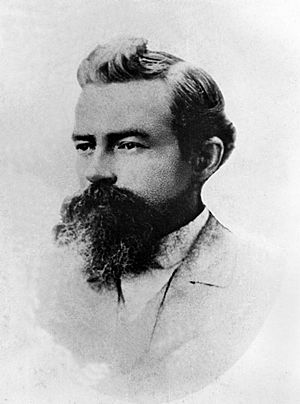Theophilus Parsons Pugh facts for kids
Quick facts for kids
Theophilus Parsons Pugh
|
|
|---|---|

Brisbane about 1870
|
|
| Member of the Queensland Legislative Assembly for Town Of Brisbane |
|
| In office 30 May 1863 – 30 January 1869 Serving with Charles Blakeney, George Raff, Alexander Pritchard, Simon Fraser, William Brookes, Kevin O'Doherty
|
|
| Preceded by | Robert Cribb |
| Succeeded by | George Edmondstone |
|
Theophilus Parsons Pugh
|
|
|---|---|
| Born | 6 November 1831 Turk's Island, Caicos Group, British West Indies
|
| Died | 14 March 1896 (aged 64) |
| Other names | 'Meeanchin' (pen-name, the Aboriginal name of the Brisbane River being 'Meeannjin', he used this to sign his articles in the Courier and other journals in the mid to late 1860s) |
| Occupation | Public servant, journalist, newspaper editor, almanac editor and proprietor, government printer, politician, pioneer of compassion (humanitarian) |
| Employer | Moreton Bay Free Press, Moreton Bay Courier, Brisbane Courier. |
| Spouse(s) | 1st 1855 Annie Thompson Trundle; 2nd 1867 Jane Montgomery |
| Children | six in the second marriage |
Theophilus Parsons Pugh (1831–1896) was an important person in early Queensland, Australia. He was a journalist, newspaper editor, and politician. He is remembered for publishing Pugh's Almanac and for fighting for the rights of Aboriginal people.
Contents
Early Life and Education
Theophilus Pugh was born in 1831 on Turk's Island, which was part of the British West Indies. His father was a Wesleyan minister.
Pugh went to school at Old Kingswood School near Bristol and Wesley College in Taunton, England. He then learned about printing. Later, he worked for several newspapers in England before moving to Australia. He arrived in Brisbane in June 1855.
Journalism and Publishing Career
Theophilus Pugh became a very well-known journalist and publisher in Queensland. He is famous for publishing Pugh's Almanac, which is still used today as a historical record.
Newspaper Editor
When Pugh first arrived in Australia, he worked as a correspondent for the Empire newspaper in Sydney. In 1855, he became the editor of the Moreton Bay Free Press. He held this job for four years.
In 1859, Pugh became the editor of the Moreton Bay Courier. This newspaper was first published twice a week, then three times a week, and by May 1861, it was published daily. In 1861, Pugh changed the newspaper's name to The Courier. In 1864, it was renamed again to the Brisbane Courier.
Fighting for Aboriginal Rights
Theophilus Pugh used his role as editor of the Brisbane Courier to speak up for Aboriginal rights. From 1860 to 1861, he wrote articles against the unfair actions of the Native Police Force in Queensland. This police force was known for its harsh treatment of Aboriginal people. Pugh's efforts helped lead to a special committee in 1861 that looked into these issues.
Pugh also spoke out against the "kanaka trade," which involved bringing Pacific Islanders to work in Queensland under difficult conditions.
Pugh's Almanac
In 1857, Pugh started publishing Pugh's Moreton Bay Almanac. It was first a single sheet, then became a book the next year. By 1860, it grew into Pugh's Queensland Almanac. This almanac was a very important guide and directory for the colony, and it has been published every year since then by different publishers.
Government Work
Pugh was also involved in the movement to separate Queensland from New South Wales. From 1857 to 1859, he worked as the secretary for the separation committee. He was also the first publisher of the Queensland Government Gazette from 1861 to 1863, before a special government printer was appointed.
Political Career
In 1863, Theophilus Pugh was elected to represent the Town of Brisbane in the Queensland Parliament. He was re-elected in 1867 and became the Chairman of Committees. He was elected again the following year but soon retired from politics.
Later Life and Public Service
After leaving Parliament, Pugh joined the civil service. He worked as a Police Magistrate, which is like a local judge, in several towns across Queensland. He served in Goondiwindi (starting in 1874), Rockhampton, Warwick, Bundaberg, Beenleigh, and finally Nanango.
Theophilus Pugh passed away in 1896 at the age of 65. He was in a private hospital in Toowoomba at the time. He was buried in the Drayton and Toowoomba Cemetery.
 | William M. Jackson |
 | Juan E. Gilbert |
 | Neil deGrasse Tyson |

